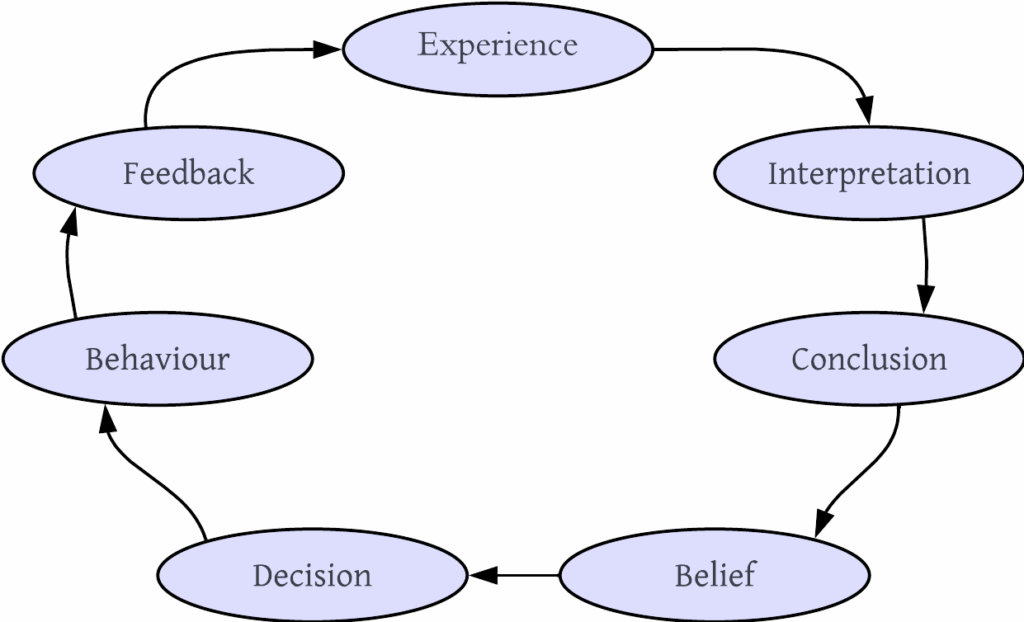The scripts we follow: Understanding our childhood conditioning and its impact on mental health
- Dnyanada
- November 28, 2023
One of my fondest memories takes me back to the time when I had ridden a bicycle for the very first time. I was around 6 years old, and I distinctly remember the wind in my hair, the taste of freedom, and a huge grin on my face. Prior to this breakthrough, the mere thought of touching my bike filled me with intense fear. My mother laid down a seemingly tough rule: “Only weak kids give in to fear. You will not come home until you learn to bike”. It felt daunting. Pedaling nervously, my heart pounded with the fear of potential falls. However, the beauty in this lies in the way my mother pushed me to confront my fears and explore what awaited beyond them.
Reflecting on this experience with my current understanding of life scripts, I’ve come to realize that it was a case of my mother conditioning me with the directive to “be strong”. But first, let’s pause and explore what exactly is a “life script”
The scripts of our lives

The Script Cycle
The script cycle defines how our experiences shape our beliefs and innate behavioural patterns
Source: The games people play, The basic handbook of Transactional Analysis; Eric Berne
Consider Aditi**, who grapples with setting boundaries and tends to attract toxic relationships. Examining Aditi’s upbringing reveals that her parents, frequently preoccupied with making ends meet, struggled to give her attention. They aspired to raise an exemplary child with proper behaviour, providing approval only when she adhered to their expectations and harshly punishing her when she didn’t. During her childhood, Aditi internalised the notion that measuring her own worth depended on meeting others’ expectations. This belief guided her choices, leading her to consistently prioritise others’ needs over her own. Consequently, she developed a pattern of seeking approval by pleasing people, interpreting catering to other’s needs as crucial for social acceptance. This behaviour persisted, becoming a habit as she continued prioritising others to feel valuable through approval-seeking and attracting relationships that took advantage of her people-pleasing tendencies.
A crucial aspect of therapy involves gaining awareness of our life scripts and understanding how, as children, we form mental frameworks of our reality. These life scripts significantly influence our behaviour and beliefs. Now, the question arises: how does one unravel this during a therapy session?
Injunctions
One way to understand what life scripts we follow is to look into the first stage of the script cycle, which is, the message or input we got from our parents. Injunctions are limiting messages received during childhood. These messages are often communicated implicitly or explicitly by significant authority figures, such as parents or caregivers. Goulding and Goulding identified 12 main injunctions, think for yourself, which of these you might have received in your childhood?
- Don’t exist: Were you welcome when you were born? Did your caretakers want you?
- Don’t be yourself: You are a girl, but did they want a boy? Do you have a sexual orientation that is not in line with what your parents/environment want? But also: were you allowed something different than what your parents had in mind for you?
- Don’t be healthy: Was being sick or having ailments a way to get attention from your caretakers?
- Don’t succeed: Were you allowed to be successful in life, or did you get the message ‘our kind of people won’t succeed anyway’?
- Don’t be important: Were you allowed to talk about yourself or even consider yourself important?
- Do not belong: Did you feel comfortable with others, or did you grow up isolated and learn to be afraid of strangers?
- Don’t get close: Was physical touch and hugging taboo in the family, or did you hear ‘you’re too old for that now’
- Don’t grow up: Could you become an adult, with all the faults that go with it, or were you kept dependent? For instance, ‘you will create a mess, i’ll do it for you’ or ‘you are so careless, let me take care of it’
- Don’t be a child: Could you be a child, or did you have to take responsibility early because of illness, divorce, or death in the family?
- Don’t feel: Could you have emotions and express yourself, or did you have to be ‘strong and tough’? For example, ‘don’t cry’, ‘be a tough girl’ or ‘stop being so weak’
- Don’t think: Were you allowed to think about yourself, others, and the world? Could you discuss, disagree, ask questions? Or was the message ‘you are too young to understand the world’ or ‘only I know what’s good for you’
- Do nothing: Were you allowed to take the initiative, be active, and come up with ideas? Or did you have to be calm and quiet and stay safe within your safety zone? for instance, ‘don’t be so energetic’, ‘don’t take risks’, or ‘do what I say’
Counterinjunctions
Counterinjunctions are affirmative and positive messages designed to counterbalance the negative effects of injunctions. For example, if a child was subjected to the injunction “don’t exist” during childhood, a corresponding counterinjunction like “try hard” serves to challenge and negate the negative belief that the individual’s existence is unwelcome or undervalued. This combination of injunction and counterinjunction leads to an adult who believes that their existence is linked with their achievements. Richard Erskine identified 5 drivers, give it a thought, which ones do you think you received growing up?
- Be strong: Were you encouraged to avoid showing vulnerability or weakness and to always project strength?
- Please Others: Were you taught to prioritize the needs and desires of others over your own, seeking constant approval?
- Try Hard: Did you feel a constant pressure to exert maximum effort and strive to achieve success in everything you did?
- Hurry Up: Were you conditioned to feel a persistent need to rush through tasks, activities, or life in general?
- Be Perfect: Did you experience intense pressure to achieve perfection in every aspect of your life, fostering a fear of making mistakes or falling short of expectations?
While counterinjunctions are intended to counterbalance negative beliefs and foster positive attitudes, they can also have potential negative effects on mental health if misapplied or taken to extremes. Here are a few ways in which counter injunctions might inadvertently contribute to mental health challenges:
- Excessive Pressure: Counterinjunctions like “Try hard” can lead to a constant sense of pressure to achieve or excel in life. Individuals may feel compelled to overachieve in an attempt to counteract negative beliefs, leading to stress, burnout, and a persistent fear of failure.
- Neglect of Authenticity: Some counterinjunctions, such as “Be strong” or “Please others,” may encourage individuals to prioritize others’ needs over their own or suppress genuine emotions. This can result in a lack of authenticity and self-neglect, potentially leading to emotional distress and a sense of disconnection from one’s true self.
- Fear of Imperfection: Counterinjunctions emphasizing perfection, such as “Be perfect,” may foster a fear of making mistakes. This fear can be paralyzing, hindering creativity, spontaneity, and the ability to learn from setbacks. Over time, the relentless pursuit of perfection can lead to anxiety, self-criticism, and procastination.
- Dependency on External Validation: Counterinjunctions focused on pleasing others may result in a dependency on external validation. If individuals constantly seek approval and affirmation, their self-worth may become contingent on others’ opinions, making them vulnerable to fluctuations in external feedback and potentially impacting self-esteem.
Messages by Indian parents
Breaking the script
Counseling untangles the stories we’ve picked up in life, allowing us to see ingrained behaviours that hold back our mental well-being. In therapy, we talk about our past and how it influences our thoughts and actions. This helps us recognize ingrained patterns formed early in life and discuss strategies to change them.
Have any of the injunctions or counter-injunctions struck a chord with you? Could they be influencing your mental well-being? If you’re interested in delving deeper into this, please feel free to schedule an introductory call with me
**The name has been changed to protect the identity of the client
Liked what you read?
Sign up and get the latest blog posts delivered straight to your inbox.
Related Arcticles

Domestic Violence Among Indian Families and its Impact on the Brain
In Indian families, domestic violence often hides behind cultural norms. This blog reveals shocking statistics and its impact on the brain.

Grief Explained: How our brains process loss
Discover the emotional and neurological aspects of grief, how rituals aid in healing, and why it’s okay to take your time.

Craving Connection: A Scientific Look at Why We Feel Lonely
Dive into the neuroscience of loneliness and discover why our brains crave real connection.
